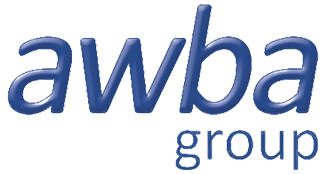Our Approach
In 2021, Myanma Awba decided to structure its approach to sustainability. Led by the Group’s CEO, this project involved all our business functions and units. A new sustainability officer was appointed, and the Group partnered with a local consultancy to:
- Identify and engage with our key stakeholders
- Prioritise our issues and structure our approach
- Structure our reporting and collect data
Prioritisation
We initially identified 48 topics related to environmental, social and governance issues. To prioritise them, we met with:
- 8 representatives of external stakeholders, including our farmers, distributors, business partners, experts on responsible business conduct, etc.
- 25 internal stakeholders, including the Executive Chairman and 1 member of the Advisory Board, and most of the members of the Executive Committee, to gather their feedback and insights.
The result of this prioritisation was approved by the Group CEO: the matrix details our 9 core priorities.
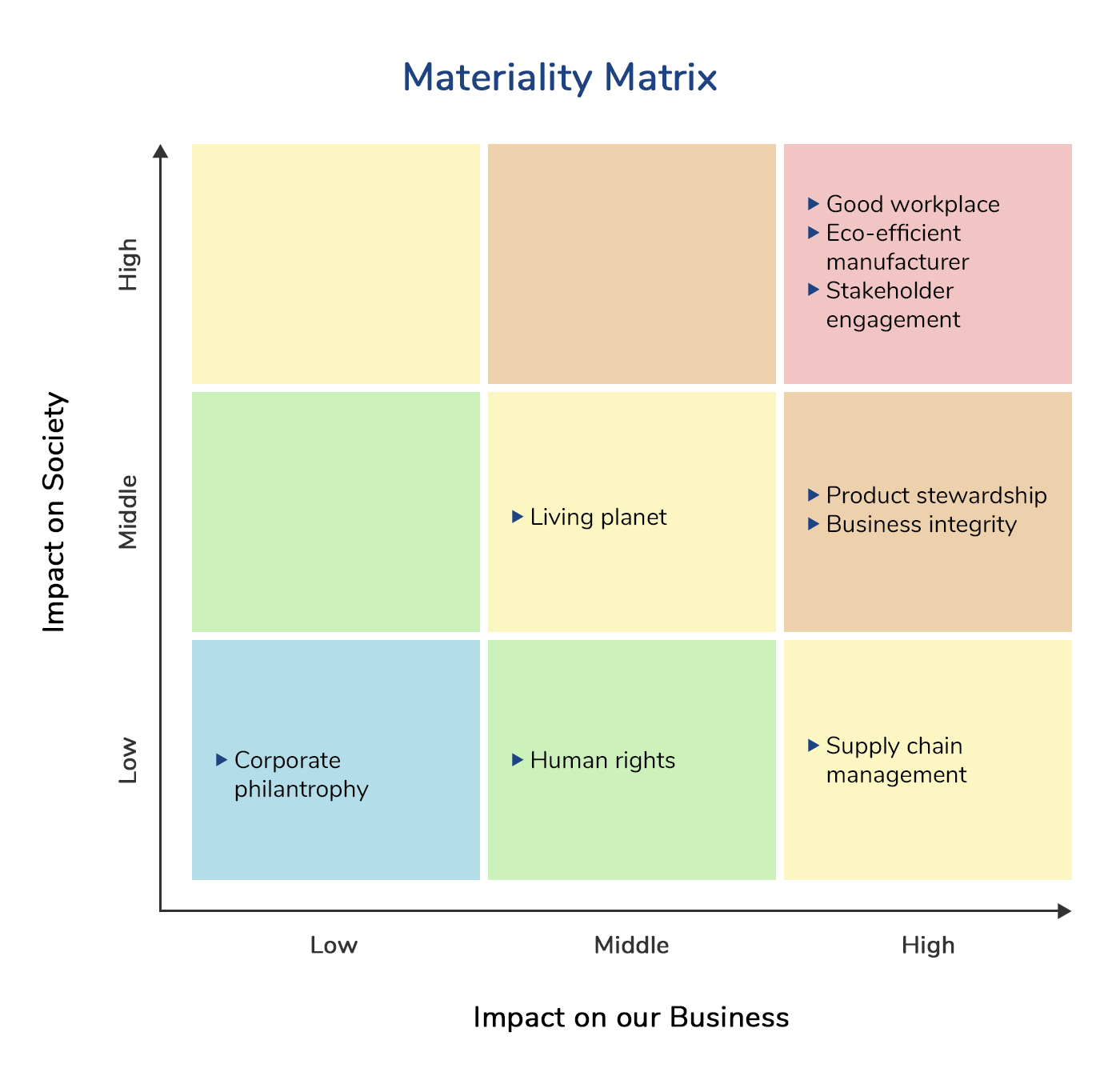
Sustainability Strategy
Farmers are the backbone of Myanmar’s economy. Their work is essential: they supply us with nutritious food while providing income for rural communities. Therefore, to deliver on our mission, Myanma Awba develops products and solutions that enable Myanmar’s farmers to better cultivate their crops.
Our sustainability strategy, Better Awba, articulates four pillars:


Standards
We consider four main standards in shaping and structuring our non-financial reporting:
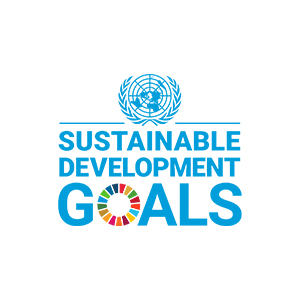
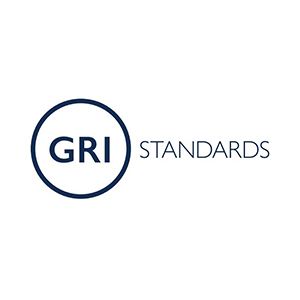
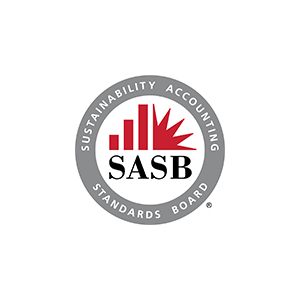
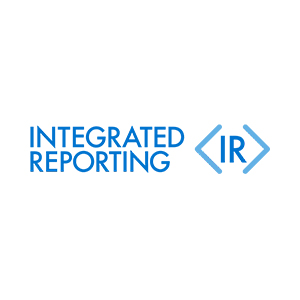
Sustainable Development Goals
Currently, we consider the following SDGs the most relevant to Myanma Awba Group:
SDG | Rationale | Key figures (FY 23/24) |
|---|---|---|
 | Agriculture is the backbone of the Myanmar economy. Fostering sustainable farming is critical to enhancing crop productivity and uplifting the livelihoods of thousands of farming communities across the country. |
|
 | As a responsible Group of companies, we aim to provide fair, inclusive and respectful working conditions to our staff. Myanma Awba Group is part of the Business Coalition for Gender Equality. |
|
 | As a company, we work to sustain our business: it generates jobs directly for our staff and indirectly for the people working with our suppliers. |
|
 | To operate, our production plants need to withdraw and discharge water. Therefore, we carefully monitor our activities to ensure that they do not lead to local problems such as pollution, water shortages, etc. |
|
 | We use various chemicals and materials to manufacture our products. We ensure that Myanma Awba complies with all the necessary rules and requirements for storing and transporting hazardous materials. |
|
 | Myanmar is one of the countries that will be heavily impacted by climate change, which will impact farmers most of all. We are working to reduce our energy consumption and our CO2 emissions. |
|
 | Bees and other pollinators are critical for sustainable farming: they enable crop growth and food production. The responsible use of our products is essential in protecting biodiversity and natural ecosystems. |
|

Zero Hunger
Agriculture is the backbone of the Myanmar economy. Fostering sustainable farming is critical to enhancing crop productivity and uplifting the livelihoods of thousands of farming communities across the country.
- 295,000+ farmers trusted our products and services
- Our experts organised 950+ training and engaged with 93,000+ farmers to share their expertise

Gender Equality
As a responsible Group of companies, we aim to provide fair, inclusive and respectful working conditions to our staff. Maha, one of our businesses, is part of the Business Coalition for Gender Equality.
- 26% of our staff are women
- 23% of our management positions are held by women
- 37% of those promoted were women

Decent Work and Economic Growth
As a company, we work to sustain our business: it generates jobs directly for our staff and indirectly for the people working with our suppliers.
- We had 2,594 staff by the end of March 2022
- We hired 112 employees and promoted 22
- We worked with 638 suppliers, of which 85% were Myanmar

Clean Water and Sanitation
To operate, our production plants need to withdraw and discharge water. Therefore, we carefully monitor our activities to ensure that they do not lead to local problems such as pollution, water shortage, etc.
- We consumed 17,514 cubic meters of water and discharged 7,407 cubic meter

Responsible Consumption and Production
We use various chemicals and materials to manufacture our products. We ensure that Myanma Awba complies with all the necessary rules and requirements for storing and transporting hazardous materials.
- We used 494,000+ metric tonnes of raw materials
- Our activities induced 4,891 metric tonnes of waste, and we recycled 103 tonnes

Climate Action
Myanmar is one of the countries that will be heavily impacted by climate change, which will impact farmers most of all. We are working to reduce our energy consumption and our CO2 emissions.
- We emitted 8,378 tonnes of CO2 equivalent
- 43% of our emissions pertained to our Scope 1

Life on Land
Bees and other pollinators are critical for sustainable farming: they enable crop growth and food production. The responsible use of our products is essential in protecting biodiversity and natural ecosystems.
- We ran thousands of communication campaigns to raise awareness regarding the responsible use of our products
GRI Standards
Our non-financial reporting is aligned with the Global Reporting Initiative (GRI) Standards and will follow the GRI Sector Standard for Agriculture before 2024. The following GRI material topics are considered relevant to our non-financial reporting:
Our GRI Index is available here.
One of our affiliates, Maha, discloses its own sustainability reports every year. They can be found here.
Economic topics
- 201 – Economic performance
- 203 – Indirect economic impacts
- 204 – Procurement practices
- 205 – Anti-corruption
Environmental topics
- 301 – Materials
- 302 – Energy
- 303 – Water and effluents
- 306 – Waste
Social topics
- 401 – Employment
- 403 – Occupational health & safety
- 404 – Training & education
- 405 – Diversity & equal opportunities
- 406 – Non-discrimination
Our GRI Index is available here.
One of our affiliates, Maha, discloses its own sustainability reports every year. They can be found here.
Our Data
All the data included on our website has been reviewed and validated by the Myanma Awba Group management on 24 February 2024. All the quantitative data covers FY21/22 (from October 2021 to March 2022) and FY22/23 (April 2022 to March 2023) unless stated otherwise. The qualitative information covers the period from January 2022 to March 2023.
The data include all the entities operated by Myanma Awba, which are mentioned here. The data disclosed has not been audited by a third party.
Myanma Awba welcomes your feedback and questions. You can contact our Group Chief Sustainability Officer by email at nyinyikyawlwinoo@awba-group.com and corporatecommunication@awba-group.com.
GRI topics | GRI material topics |
|---|---|
Economic topics |
|
Environmental topics |
|
Social topics |
|
